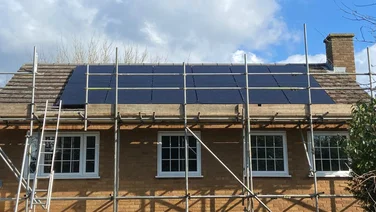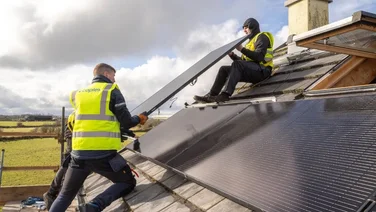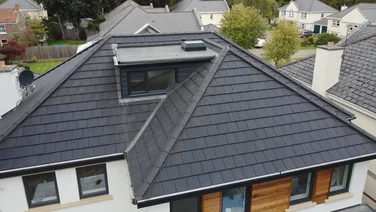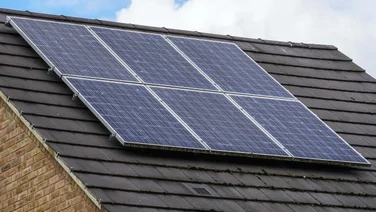- What’s on this page?
- What is the MCS certificate for solar panels?
- Do you need an MCS certificate for your solar panels?
- How do you get an MCS certificate for your solar panels?
- Why is the MCS certificate important for homeowners?
- What if I want to install solar panels myself?
- Which other green technologies are certified by the MCS?
- Summary
✔ MCS stands for the Microgeneration Certification Scheme
✔ The scheme gives consumers the confidence to invest in green technology
✔ It’s recommended that you opt for MCS-accredited solar panel installers
Considering going solar? Before you jump into the nitty-gritty (such as solar panel costs), there are a few key things you should do to make sure everything goes smoothly.
You’ll want to compare at least three quotes to get the best deal, do your research on solar panel brands, and make sure your installer and supplier are both MCS certified.
If you’ve already started researching solar panels, you will have seen the acronym ‘MCS’ floating around, which stands for the Microgeneration Certification Scheme. This is a key tool in helping homeowners receive top-quality care when buying solar panels – and we’re here to clear up any confusion about the scheme.
Already familiar with the MCS certificate? Maybe it’s time to skip the reading and start comparing solar panel quotes now. You can speed up the process by using our easy-to-navigate tool. All you have to do is provide a few quick details, and our expert installers will be in touch with free quotes for you to compare.
Where do you want to install solar panels?
Get started
What’s on this page?
What is the MCS certificate for solar panels?
MCS stands for the Microgeneration Certification Scheme (MCS) – an initiative that was introduced in 2007 to support the fast-growing microgeneration (small-scale production of heat or electric power) industry in the UK.
An installer with an MCS certificate will have the know-how on all the safety and efficiency measures to take when installing solar panels. On top of this, products with an MCS certificate will be designed and produced to a very high standard.
Ultimately, the scheme gives consumers the confidence to invest in green technology by setting standards for both products and installers.
This scheme applies to various green tech products, including both solar thermal and solar photovoltaic (PV) panels.
Installer standards
A solar panel installation will be rewarded with an MCS certificate if it:
- Is commissioned by an MCS-certified installation company
- Is built with MCS-certified products
- Has a commissioning date after 15th July 2009
There’s also a huge list of standards that the best solar panel installers need to meet to become MCS certified. We won’t bore you with all of them, but here are some of the noticeable ones:
- Contractors need to have the competence and capability to supply the design, installation, commissioning, and handover of solar PV systems
- Contractors should disclose any technical information to the customer before selling the solar panels, including an accurate performance estimate, drawing of the module layout, and datasheets for any products involved
- Installers need to demonstrate that they are aware of all current solar legislation
- Contractors need to assess the building to make sure it’s compliant with building regulations
- Suitable risk assessments need to be carried out on the building and the solar panel system
- All equipment should be installed in accordance with the manufacturer’s instructions
- Solar panel layout should allow access for maintenance and emergency services
Product standards
Similar to the installation, products with an MCS certificate are also subject to a long list of regulations, including:
- All components need to be designed to adhere to the latest IET Code of Practice for Grid Connected Solar PV Systems
- Solar panels need to be on the list of MCS-approved modules
- Any parts used in the solar panel system should only be used for functions that they are designed for
- Above all, equipment should be fit for purpose
Do you need an MCS certificate for your solar panels?
Unlike the Gas Safe Register, solar panel installers and suppliers are not required by law to be MCS accredited.
Instead, the scheme rewards suppliers, installers, and products with a certificate if they meet a certain standard – reassuring customers that the product and service they’re investing in will be of a good quality.
If a solar product or installer isn’t MCS accredited, it’s worth being a bit cautious.
Although it’s not a legal requirement for installers to be MCS accredited, consumers need to have a certificate for their solar panels if they are applying for financial funding through an incentive scheme, such as the Smart Export Guarantee (SEG).
Ofgem states that anyone installing solar PV, wind, and micro-CHP installations up to 50 kW needs to demonstrate that the installation and installer are ‘suitably certified’. It also states:
“If a generator is unable to demonstrate that their installation is suitably certified, an SEG licensee is not obliged to offer payments under the SEG, but they can make payments if they wish.”
Where do you want to install solar panels?
Get startedHow big is your solar panel system, and how roughly much did it cost?
We had a combined package of solar panels and solar batteries, with a capacity of 13.8 kilowatts (kW). The total cost was £14,500. The panels were about £5,000.”
What was the experience like buying the panels?
“We started getting quotes in December 2022. We had three quotes. The package we picked was not the cheapest, but the company had a shorter lead in time as it had stockpiled solar and batteries […].“[The installation] took two weeks. The scaffolding went up, then the panels went up, and then the electrics in the loft and garage were completed. The only issue we had was that the scaffolding was left up for a couple of weeks.”
How much money do your solar panels save you on your electricity bills?
“We used to pay about £100 a month to fuel the car, and £240 for gas and electricity. Our electricity bill for July 2023 was £60.“As we haven’t had a full winter with the heat pump, we cannot say what the winter costs are. But overall, we are no longer concerned about fuel bills.”
Kassy lives in North Yorkshire, and has owned solar panels and solar batteries since February 2023.
How do you get an MCS certificate for your solar panels?
The solar panel installer should issue your MCS certificate within 10 working days of the installation being completed.
If you haven’t received your MCS certificate within 10 working days, it’s worth calling the MCS Helpdesk on 0333 103 8130. Bear in mind that you’ll need to provide information about the installation, including the type of system installed and your full address.
The MCS Helpdesk Team can also assist customers if their original Installer is no longer MCS certified, or is no longer trading.
Want to get yourself a set of solar panels for your property? Compare quotes with our easy-to-navigate tool. All you have to do is provide a few quick details, and our expert installers will be in touch with free quotes for you to compare.

Why is the MCS certificate important for homeowners?
Safety
By using an MCS-certified installer, homeowners can rest assured their solar panel system is in good hands, as the installers have to undergo rigorous vetting processes. This means they can offer a service that’s up to the right standards, and can install the products with safety in mind.
MCS-certified installers are also members of a Consumer Code, which aims to protect customers – but more on that later.
Quality of installation
An MCS-certified solar panel is made with high-quality materials, and performs to a certain standard.
That’s why it’s a good idea to get an accredited panel if you’re considering getting a solar panel system, to ensure that the equipment meets good standards of performance.
Our latest National Home Energy Survey shows 69% of people are likely or very likely to buy or rent a property with solar panels – but if the installation isn’t MCS-approved, it may become a complicating factor to any sale.
Consumer protection
All MCS-certified installers need to be registered with a Trading Standards Institute (TSI) Consumer Code. These codes mean installers need to go above and beyond minimum consumer law obligations, including problems with pre-sale and contractual issues.
Basically, having an MCS-accredited installer provides an extra level of protection if something goes wrong with your solar panels.
The Smart Export Guarantee
Although it’s not a legal requirement for all solar panels to have an MCS certificate, it is needed if you want to qualify for various financial incentives, such as the Smart Export Guarantee – a government-backed initiative that compels large energy suppliers to pay homeowners for the renewable energy they send back to the National Grid.
What if I want to install solar panels myself?
Technically, you can install solar panels yourself, but we wouldn’t recommend it.
We don’t doubt your handy work, but a trained professional with an MCS certificate will be able to install solar panels to the standard you’d ideally want – and to the standard expected by the Smart Export Guarantee.
Installing solar panels yourself also comes with a handful of risks – you could damage the panel and the property, and even hurt yourself.
You can find more information about DIY solar panel installation on our page: Can You Install Solar Panels Yourself?
Which other green technologies are certified by the MCS?
MCS certification isn’t exclusive to solar panels – it also covers a wide range of low-carbon and renewable energy installations, including:
- Solar photovoltaic (PV) panels – up to 50 kW
- Solar thermal collectors – up to 45 kW
- Heat pumps – up to 45 kW
- Biomass boilers – up to 45 kW
- Combined Heat and Power (CHP) boilers – 50 kW for electricity and 45 kW for heating
- Hydroelectric systems – up to 50 kW
- Wind turbines – up to 50 kW
And as the green tech industry continues to evolve, more appliances are expected to make their way onto this list.
Summary
So there you have it – everything you need to know about the MCS certificate for solar panels. And now you’re up to date with the latest information about this scheme, you’ll know what to look out for when it comes to buying solar panels.
If you want to speed up the process of buying solar panels, try our easy-to-navigate tool. All you have to do is provide a few quick details, and our expert installers will be in touch with free quotes for you to compare.





